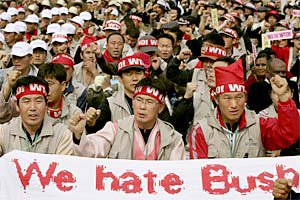
Note of the caption: Korean protesters for WTO in Hong Kong during the summit.
link to the caption
January 9, 2006
HONG KONG, Jan. 9 - The prosecution of 14 people here following a violent demonstration at the World Trade Organization conference last month is turning into a contentious and diplomatically sticky issue for the governments of Hong Kong, China and South Korea.
Labor union federations and social groups, mainly from Asia and Europe, are trying to portray the 14 as "W.T.O. political prisoners." They held a small march here today and said they had sent delegations to deliver letters, and in some cases hold demonstrations, at Chinese consulates and embassies in New York City and in Bangladesh, Belgium, Hungary, Thailand and Switzerland.
All but three of the protesters are South Korean, and their prosecution has drawn considerable attention in their home country, with three of the country's most famous movie and soap opera stars issuing a recent appeal for their release. The prosecution also coincides with considerable resentment in South Korea of China's tough treatment of refugees from North Korea, many of whom have been repatriated to face long prison terms and even execution.
The South Korean government has appealed to the Hong Kong government repeatedly to release the protesters here, all men. But the Hong Kong authorities have refused, pointing out that the protest here on the night of Dec. 17 left 137 people injured, including 67 police officers.
"Hong Kong is a place where the rule of law is strongly upheld," said Wong Yan-lung, Hong Kong's secretary for justice, after meeting here today with three opposition lawmakers from South Korea who complained about the prosecution. "This case is being processed in accordance with the laws of Hong Kong and our established and announced prosecution policy."
Britain returned Hong Kong to China in 1997, but Hong Kong retains its own independent legal system. Huge democracy demonstrations here over the past two years have been completely peaceful, and government officials have expressed worries that local radicals might misinterpret leniency toward the W.T.O. protesters as a willingness by the government to tolerate violence.
Hong Kong has close to 7,000 South Korean citizens, and Lee Kyu-hyung, South Korea's vice foreign minister, came here two days after the protest to express regret for the confrontation as well as to ask for the release of all detainees.
The protesters, 11 of whom began a hunger strike last Thursday, contend that they are all innocent and are victims of mistaken identity. Yang Kyung-kyu, the president of the Korean Federation of Transportation, Public and Social Services Workers' Unions and one of the 14 protesters being prosecuted, said at a news conference here on Monday that the Hong Kong police lacked experience in distinguishing people of Korean descent.
The police encircled the protesters on the night of Dec. 17 and then arrested more than 1,000 of them the following morning. All except 14 were released a day later.
The 14 have been released on bail but have not been allowed to leave the territory, with the exception of one who is a Taiwanese student and has been allowed to go home for exams after Taiwan's government posted nearly $13,000 in bail, said Mabel Au, a spokeswoman for the Hong Kong People's Alliance on W.T.O., which organized many of the protests here. Another protester is Japanese and the last is a mainland Chinese citizen.
The next court hearing is scheduled for Wednesday. The protesters have been charged with unlawful assembly and officials have said that they are considering other charges, including assaulting police officers.
Many in Hong Kong have been shocked by televised scenes of protesters who maneuvered around front-line police in riot gear and began using plywood boards and steel pipes to strike lightly protected officers. One police officer was hospitalized for 10 days with a fractured foot, but most were treated and released the night of the protest.
Police officers have long enjoyed high social standing here, with excellent benefits - especially education benefits for their children - allowing thousands of working-class men and women and their children to move up the social ladder. Donald Tsang, Hong Kong's chief executive, is the son of a police sergeant.
Keith Rockwell, the W.T.O.'s spokesman, said that security arrangements were the responsibility of the host government. No city has volunteered yet to hold the next W.T. O. ministerial conference.
link to the original posting
No comments:
Post a Comment